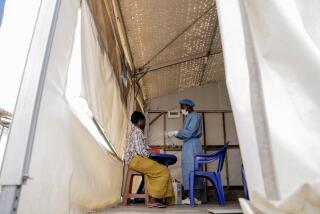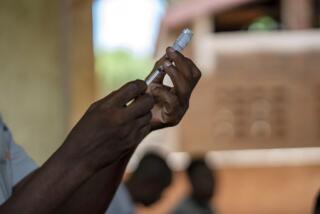Ebola vaccine highly effective in Guinea trial
- Share via
An experimental vaccine tested in more than 7,500 people in Guinea was highly protective against Ebola in a preliminary analysis.
Results from the Phase III clinical trial were reported Friday in the medical journal The Lancet.
Organizations who sponsored the work, including the World Health Organization and Medecins Sans Frontiers, lauded the outcome of the work as a hopeful step in the fight against the devastating virus, which has killed more than 11,000 people in West Africa during the current outbreak and sickened more than 15,000 others.
“For the first time ever, we received evidence of efficacy of a vaccine that will help [with] fighting Ebola,” Medecins Sans Frontieres medical director Bertrand Draguez said in a statement. “This is a unique breakthrough.”
At the same time, Draguez cautioned, more research would be needed to know exactly when protection kicks in, how long it lasts and other details.
The Ebola ca Suffit (“Ebola this is enough”) trial was launched on March 23. Health workers offered vaccines to close contacts of newly diagnosed Ebola patients in the region of Basse-Guinea. The participants, all adults older than 18 who weren’t pregnant or breastfeeding, were randomized into two groups. One group received an intramuscular injection of the rVSV-ZEBOV vaccine immediately; the other group received a dose after a delay of 21 days.
Workers then visited the trial participants at home on six occasions over the following 12 weeks to monitor their condition. Among the 2,014 people vaccinated immediately, none had developed Ebola within 10 days. Among the 1,498 people vaccinated after the 21-day delay, 16 fell ill — demonstrating that the intervention was effective.
Randomization was halted on July 26 so that all patients could start receiving the vaccine immediately. Younger people also will now be eligible for the trial, the World Health Organization said.
The agency also noted that the approach used in the trial seemed to have conferred protection to unvaccinated people in the wider community around them. “Ring vaccination,” as it’s called, is an approach that was used in the past to combat smallpox. It aims to create a sort of firewall around sickened people by vaccinating the contacts around them.
Draguez said his organization would start using the vaccine on health workers and was planning to encourage trials of the vaccine in Sierra Leone and Liberia.
For more on science and health, follow me on Twitter: @LATerynbrown.
MORE FROM SCIENCE
After a bounce, Rosetta’s Philae lander serves up cometary surprises
Devastating floods might be more common than we thought, study says
As a killer fungus looms, scientists call for a ban on salamander imports







